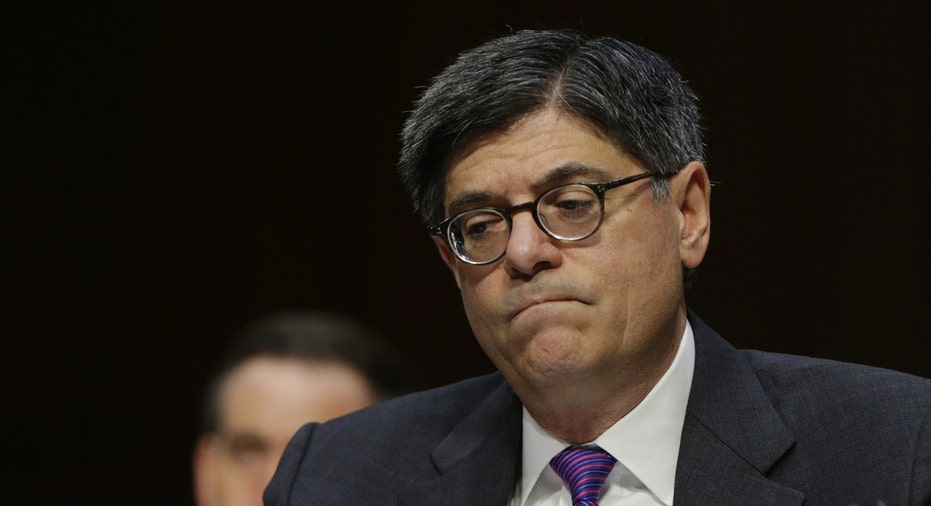Treasury's Lew Says Congress Must Raise Debt Limit by Nov. 5

The government will run out of money to pay its bills sooner than previously thought, forcing Republican lawmakers who are already scrambling to elect new leaders to immediately confront a series of unpopular fiscal deadlines. Treasury Secretary Jacob Lew said the government would be left with just $30 billion cash on or around Nov. 5. Government outlays can be twice that level on certain weekdays, underscoring the need to raise the federal borrowing limit, Mr. Lew said in a letter late Thursday to House Speaker John Boehner (R., Ohio). "Without sufficient cash, it would be impossible for the United States of America to meet all of its obligations for the first time in our history," Mr. Lew said in the letter. The new debt-ceiling deadline falls less than a week after Mr. Boehner will leave Congress, putting pressure on him-and an incoming Republican leadership team-to pass legislation raising the limit before that transition. Some congressional estimates had indicated the government could get by without action until December. Traders and Wall Street analysts are watching the timeline closely due to the turbulence that hits financial markets as debt-limit deadlines approach. Mr. Boehner has said he wants to help his replacement by dispatching thorny issues before he leaves office and none is more politically difficult for Republicans than raising the debt ceiling. The next speaker, expected to be Majority Leader Kevin McCarthy (R., Calif.), would have to officially begin his job confronting intense GOP backlash over raising the debt ceiling if Mr. Boehner hasn't addressed the issue before his departure. Because so many Republicans object to increasing the borrowing limit, debt-ceiling increases can typically only pass the House with Democratic support. The Treasury Department has used emergency measures to avoid breaching the debt ceiling, at $18.1 trillion, since mid-March. In August, the Congressional Budget Office estimated the U.S. would be unable to pay its bills without an increase in the borrowing limit by late November or early December. Mr. Lew had previously estimated those measures would last until late October and possibly longer but refrained from giving a specific date because of tax payments due Sept. 15. On Thursday, he said tax receipts were lower than projected while other payments the government made last month were higher, lowering the cash resources available to the Treasury. Lawmakers face a series of other fiscal deadlines this fall. Authorization for spending on the highway trust fund expires on Oct. 29. Congress on Wednesday approved a stopgap measure to keep federal agencies funded through Dec. 11, and some lawmakers had thought that a bipartisan deal to fix spending caps at slightly higher levels than allowed by law would provide a vehicle for a debt-limit increase. Republicans have typically tried to wring concessions from the White House in exchange for debt-limit increases, though they haven't yet said what that would include this time around. Mr. Obama and officials throughout his administration, pointing to their long-standing stance, say they won't negotiate on budget or policy changes in exchange for an increase in the debt ceiling. House Republicans have also prepared legislation to prioritize debt payments, but senior Treasury officials have dismissed those measures as unworkable because the U.S. would still be unable to make certain payments, which constitutes default. Rep. Mick Mulvaney (R., S.C.) said he had "encouraging conversations" with GOP colleagues over the last month around demanding changes to entitlement programs as part of any debt-ceiling package. "Spending for the sake of spending is going to be a real difficult vote," he said. Still, it isn't clear what such a package would look like, and several Senate Republicans who face close elections next year have resisted proposals for big changes to popular programs like Social Security and Medicare. The latest series of deadlines raise risks for investors of increased uncertainty after two years of relative budget tranquility. "What is becoming more concerning from an economic growth perspective is that we're going right down to the deadline in many of these cases," said Michael Brown, an economist at Wells Fargo & Co. In 2011, Standard & Poor's downgraded the U.S. triple-A credit rating for the first time after the Treasury came within days of being unable to pay certain benefits such as Social Security. The fight helped trigger a swift stock-market tumble. In 2013, the government endured a 16-day shutdown that ended with a bill suspending the debt limit for several months. Budget analysts say the repeated standoffs have come at a cost to the government. During the 2013 showdown, borrowing costs for the U.S. rose rapidly in the final weeks and days before the debt-limit deadline, according to a July report from the Government Accountability Office, an independent investigative arm of Congress. The GAO report found investors reported taking "the unprecedented action of systemically avoiding certain Treasury securities" that matured around the time Treasury estimated it would exhaust its borrowing authority. The conclusion was remarkable because Treasuries are considered to have the full faith and credit of the U.S. government, and yet some of them weren't being accepted as collateral. Disruptions in the Treasury market, the report added, extended into other markets, such as short-term financing. Raising the debt ceiling doesn't approve new spending by the government. Instead, it allows the government to borrow to pay debts it has already incurred. Stronger growth this year has led the deficit to fall faster than analysts expected at the beginning of the year. The deficit for the 12 months ended August fell to $424 billion, or around 2.4% of gross domestic product, down from $514 billion, or 2.9%, a year earlier. Write to Nick Timiraos at nick.timiraos@wsj.com



















